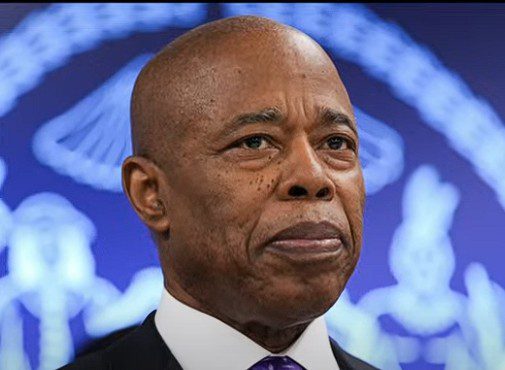ERIC ADAMS OFF THE HOOK

ADAMS CASE DISMISSED WITH PREJUDICE
BY SNN.BZ STAFF
Federal Judge Dismisses Corruption Charges Against NYC Mayor Eric Adams (with prejudice), Ending Historic Case.
New York, April 2, 2025 – In a landmark decision, U.S. District Judge Dale E. Ho dismissed corruption charges against New York City Mayor Eric Adams on Wednesday, permanently closing a case that marked the first time a sitting NYC mayor faced federal criminal accusations in modern history. The ruling not only ends the legal saga but also caps an extraordinary sequence of events that sparked resignations, political upheaval, and fierce criticism of President Donald Trump’s Justice Department.
The charges, initially brought in September 2024 under President Joe Biden’s administration, accused Adams of accepting over $100,000 in illegal campaign contributions and lavish travel perks from Turkish officials and business leaders while serving as Brooklyn borough president. The indictment, filed by the U.S. Attorney’s Office for the Southern District of New York, alleged conspiracy, bribery, wire fraud, and other offenses tied to Adams’ efforts to influence city policies in favor of his benefactors. Adams, a Democrat elected in 2021, pleaded not guilty and maintained his innocence throughout the ordeal.
A Controversial Turn Under Trump’s DOJ
The case took a dramatic turn in February 2025, when new leadership at the Justice Department, appointed by President Donald Trump following his return to office, intervened. Acting Deputy Attorney General Emil Bove, a former Trump defense attorney, ordered prosecutors to drop the charges on February 10, 2025. Bove argued that the prosecution interfered with Adams’ ability to govern and support Trump’s immigration enforcement priorities, citing Executive Order 14147, “Ending the Weaponization of the Federal Government,” and a memorandum from newly confirmed Attorney General Pam Bondi.
The Justice Department’s motion sought dismissal “without prejudice,” meaning the charges could be refiled later—a move that critics argued would give Trump leverage over Adams. Bove’s directive triggered a revolt within the department. Interim U.S. Attorney for the Southern District of New York, Danielle Sassoon, refused to comply, calling the decision a “quid pro quo” tied to Adams’ cooperation on immigration policy. Sassoon resigned on February 13, 2025, alongside six other senior prosecutors, including Hagan Scotten, a lead prosecutor on the Adams case, and five high-ranking officials in Washington, D.C. Their departures marked the largest mass resignation of federal prosecutors in decades.

Judge Ho’s Ruling: A Rebuke to the DOJ
Assigned to the case in September 2024, Judge Dale E. Ho, a Biden appointee and former ACLU voting rights lawyer, presided over the contentious proceedings. On February 14, 2025, the Justice Department formally requested dismissal, prompting Ho to schedule a hearing on February 19. During the hearing, Adams testified, “I have not committed a crime,” while Bove defended the dismissal as an exercise of prosecutorial discretion. However, Ho expressed skepticism, questioning the DOJ’s motives and the implications of leaving the refiling option open.
To ensure a thorough review, Ho appointed Paul Clement, a former U.S. Solicitor General under President George W. Bush, as an outside counsel on February 21, 2025. Clement’s March 7 brief recommended dismissal “with prejudice,” arguing that allowing future charges would hang “like the proverbial Sword of Damocles” over Adams, undermining public interest. Ho delayed the trial, originally set for April 21, 2025, to deliberate further.
In his 78-page ruling on April 2, 2025, Ho granted the dismissal but rejected the DOJ’s “without prejudice” request, ensuring the charges could not be revived. He delivered a scathing critique of the Trump administration’s Justice Department, writing, “Everything here smacks of a bargain: dismissal of the indictment in exchange for immigration policy concessions.”
Ho dismissed Bove’s rationales—claims of prosecutorial impropriety, election timing, and immigration enforcement needs—as “thin” and “pretextual,” finding “no evidence—zero—that [career prosecutors] had improper motives.” He emphasized that dismissing the case without prejudice would create “the unavoidable perception that the Mayor’s freedom depends on his ability to carry out the immigration enforcement priorities of the administration.”
Political Fallout and Key Players
The decision reverberated across New York’s political landscape. Governor Kathy Hochul, a Democrat, had considered removing Adams from office amid the controversy but opted against it on February 20, 2025, proposing instead new oversight measures for City Hall. Four of Adams’ top deputies—First Deputy Mayor Sheena Wright, Deputy Mayor for Public Safety Philip Banks III, Deputy Mayor for Operations Meera Joshi, and Deputy Mayor for Health and Human Services Anne Williams-Isom—resigned in February 2025, citing turmoil over Adams’ alignment with Trump’s agenda.
Adams’ attorney, Alex Spiro, hailed the ruling as a victory, asserting, “From Day 1, the mayor has maintained his innocence, and now justice has prevailed.” Spiro had denied any quid pro quo, a claim Adams echoed under oath. Meanwhile, Trump’s border czar, Tom Homan, had publicly warned Adams to comply with deportation efforts, intensifying perceptions of political pressure.
Critics, including New York Attorney General Letitia James and advocacy group Common Cause, condemned the DOJ’s actions. Common Cause’s attorney, Nathaniel Akerman, had urged Ho to appoint a special prosecutor, a request the judge declined. Former U.S. Attorneys from New York, New Jersey, and Connecticut—Preet Bharara, Paul Fishman, and John Durham—filed a brief on February 17, 2025, calling for an inquiry into the DOJ’s motives, which Ho partially addressed through Clement’s appointment.
A Historic Case Concluded
The dismissal spares Adams a trial but leaves his political future uncertain as he faces a crowded Democratic primary in June 2025. Challengers, including former Governor Andrew Cuomo, have capitalized on the scandal. Public Advocate Jumaane Williams, a vocal Trump critic, was briefly poised to replace Adams if Hochul had acted.
For Judge Ho, the ruling underscores his reputation as a deliberate jurist unafraid to challenge executive overreach, drawing on his prior clashes with Trump policies at the Supreme Court. For the Justice Department, the episode—driven by Bove, Bondi, and Deputy Attorney General Todd Blanche—exposes deep divisions and raises questions about prosecutorial independence under Trump’s second term.
As New York City moves forward, the Adams case stands as a historic flashpoint, blending law, politics, and power in a way that will echo beyond April 2, 2025.





 Afrikaans
Afrikaans Albanian
Albanian Amharic
Amharic Arabic
Arabic Armenian
Armenian Azerbaijani
Azerbaijani Basque
Basque Belarusian
Belarusian Bengali
Bengali Bosnian
Bosnian Bulgarian
Bulgarian Catalan
Catalan Cebuano
Cebuano Chinese (Simplified)
Chinese (Simplified) Chinese (Traditional)
Chinese (Traditional) Corsican
Corsican Croatian
Croatian Czech
Czech Danish
Danish Dutch
Dutch Esperanto
Esperanto Estonian
Estonian Filipino
Filipino Finnish
Finnish French
French Frisian
Frisian Galician
Galician Georgian
Georgian German
German Greek
Greek Gujarati
Gujarati Haitian Creole
Haitian Creole Hausa
Hausa Hawaiian
Hawaiian Hebrew
Hebrew Hindi
Hindi Hmong
Hmong Hungarian
Hungarian Icelandic
Icelandic Indonesian
Indonesian Irish
Irish Italian
Italian Japanese
Japanese Javanese
Javanese Kannada
Kannada Kazakh
Kazakh Khmer
Khmer Korean
Korean Kyrgyz
Kyrgyz Lao
Lao Latin
Latin Latvian
Latvian Lithuanian
Lithuanian Luxembourgish
Luxembourgish Macedonian
Macedonian Malagasy
Malagasy Malay
Malay Malayalam
Malayalam Maltese
Maltese Maori
Maori Marathi
Marathi Mongolian
Mongolian Myanmar (Burmese)
Myanmar (Burmese) Nepali
Nepali Norwegian
Norwegian Pashto
Pashto Persian
Persian Polish
Polish Portuguese
Portuguese Punjabi
Punjabi Romanian
Romanian Russian
Russian Samoan
Samoan Scottish Gaelic
Scottish Gaelic Serbian
Serbian Sesotho
Sesotho Shona
Shona Sindhi
Sindhi Sinhala
Sinhala Slovak
Slovak Slovenian
Slovenian Somali
Somali Spanish
Spanish Sundanese
Sundanese Swahili
Swahili Swedish
Swedish Tajik
Tajik Tamil
Tamil Telugu
Telugu Thai
Thai Turkish
Turkish Ukrainian
Ukrainian Urdu
Urdu Uzbek
Uzbek Vietnamese
Vietnamese Welsh
Welsh Yiddish
Yiddish Yoruba
Yoruba Zulu
Zulu